Our Premium Soil Improver
Desert Compost is our flagship product, designed to make sandy soils as fertile as they can be.
Locally manufactured
Sustainable & recyclable
Enables dedesertification
Increases yields up to 100%
Reduces water use up to 75%
Made from organic waste inputs
Designed by scientists
Thoroughly tested stable benefits
BENEFITS
Higher yields – improves soil fertility increasing a crop’s yields up to 100%
Fertilisers savings – contains major crop nutrients including phosphate, potash, magnesium and sulphur
Suppress pest and diseases – contains beneficial soil microorganisms that help to inhibit pests and diseases reducing the need for chemical pesticides
Better water management – increases water infiltration and retention, making soil more resilient to both droughts and floods
Reduce chemical use – complements and enhances the performance of inorganic fertilisers, reducing the overall quantity needed
Optimal pH – buffers the acidifying effects of high nitrogen inputs, helping to keep soils at optimal pH
Resilient soils – improves long-term soil health, fighting desertification and soil erosion
Quality Control
We rigorously test the benefits of Edama’s products, drawing upon our expertise in plant science as well as the fantastic facilities available at KAUST’s Plant Growth Core Labs.
Tested benefits for soil properties:
water holding capacity
water infiltration and drainage
structure
fertiliser efficiency
mitigation salinity
Benefits for plant performance:
growth
yield
health
harvest quality
disease resistance
DIRECTION FOR USE
You can’t really go wrong by applying a 5cm-deep layer of compost on the area you want to improve and mixing it into the top 10-15cm of existing soil. You can also skip working it in and leave the compost as a mulch layer.
To prepare soil to fill new pots, mix one part compost with three parts potting soil to give your plants a boost. To prepare soil to fill raised beds, mix one part compost with two parts of local sandy soil.
Growing vegetables
At the beginning of the season, work up to 5 cm into the top 10-15cm of soil. Add a handful of compost into each hole when planting. Water thoroughly after planting. Once plants start growing, add 1-2 cm of compost around the base of each plant. Repeat monthly for ‘hungry’ plants such as tomatoes, zucchini and squash.
Growing flowers
To prepare new beds, work up to 5 cm of compost into the top 10-15 cm of soil. Water thoroughly after planting. For established beds, loosen the top 5 cm of soil before working in up to 5cm of compost, or apply a layer of up to 5 cm of compost as a mulch.
Potted plants
Mix two parts compost with one part sand or perlite to all new pots. Add up to 5 cm of compost to potted plants twice a year.
Lawns and turf
To establish new turf, work in up to 10 cm of compost into the top 15-20 cm of soil. For existing turf, apply 1-2 cm of compost to damaged areas and work in gently using a rake
Tree and shrub planting and maintenance
When planting new trees, work in 2-3 cm of compost into the top 5 cm of soil from the trunk of the tree to as far as the tree canopy extends.
Don’t add compost to a freshly dug hole when planting a new tree.
For established trees, gently loosen the top 5 cm of soil, avoiding damage to shallow roots, before working in up to 5 cm of compost. Repeat up to twice a year. Apply compost as a mulch by spreading up to 5 cm of compost from the trunk to as far as the canopy extends. Keep compost away from the bark of the tree.





